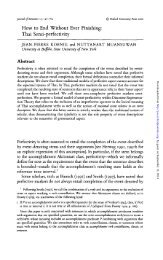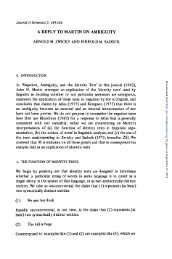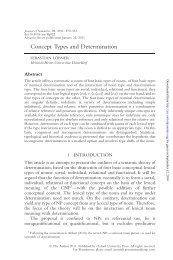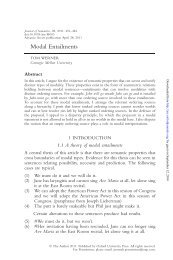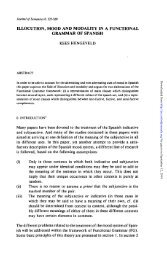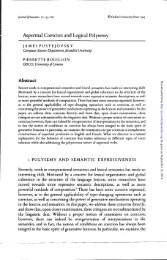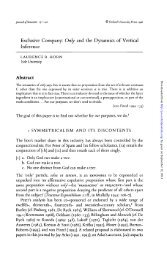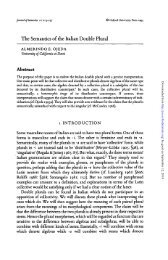Lexical Pragmatics - Journal of Semantics
Lexical Pragmatics - Journal of Semantics
Lexical Pragmatics - Journal of Semantics
Create successful ePaper yourself
Turn your PDF publications into a flip-book with our unique Google optimized e-Paper software.
Reinhard Blutner 135true. Clearly, as in the binary case we get for any number <strong>of</strong> arguments(AND, OR) as a Horn-scale which predicts that (18a) implies (18b).(18) (a) ORfS,, S a , . . . , S n )(b) NOT AND(S,, S 2) ..., S,,)Unfortunately this prediction is too weak. The conjunction <strong>of</strong> (18a) and(18b) yields an formula which is true if any number <strong>of</strong> disjuncts smallerthan n is true. This is correct for n = 2, but wrong for more argumentssince a general account <strong>of</strong> the exclusive interpretation would have topredict the interpretation according to which it is true in case one (and onlyone) disjunct is. The utterance <strong>of</strong> (19) certain does not invite you to takeeither one or two <strong>of</strong> the items mentioned.(19) With the salmon you can have fries, rice or a baked potato.It is easy to check that the current account yields the right result. As anexample consider the case <strong>of</strong> three disjuncts a = OR(S,,S 2 ,S 3 ). Thederivation <strong>of</strong> the exclusive interpretation runs as above, but now basedon the following alternatives a' o = AND(S n S 2 ,S 3 ), a[ =AND(S,,S 2 ),a' 2 — AND(S,, S 3 ), c^ = AND(S 2 , S 3 ). Again the central point is that thestronger expressions realkes the relevant state descriptions with higherprobability than the weaker expressions thereby blocking them for theinterpretation <strong>of</strong> OR(Si, S2, S3).It should be noted that we did not include the single disjuncts amongthe alternatives. This is motivated by the independent requirement (whichany theory <strong>of</strong> Q-based implicatures has to make, but which is notoriouslydifficult to formalize) that the alternatives must contrast in view <strong>of</strong> anelement which is qualitatively similar in a relevant sense. This is a generalphenomenon. In spite <strong>of</strong> the entailment relation licensed by existentialgeneralization a proper name as 'John' does not form a contrast class with aquantifier like 'some'. 'All' being a quantifier itself does.' 3The next class <strong>of</strong> examples deals with the phenomenon <strong>of</strong> (partial) lexicalblocking. Aron<strong>of</strong>f (1976) has shown that the existence <strong>of</strong> a simple lexical itemcan block the formation <strong>of</strong> an otherwise expected affixally derived formsynonymous with it. In particular, the existence <strong>of</strong> a simple abstract nominalunderlying a given -ous adjective blocks its nominalization with -ity.(20) (a) curious-curiositytenacious-tenacity(b) furious-*furiosity-furyfallacious-*fallacity-fallacyWhile Aron<strong>of</strong>f's formulation <strong>of</strong> blocking has been limited to derivationalprocesses, Kiparsky (1982) notes that blocking may also extend to inflectionalDownloaded from http://jos.oxfordjournals.org/ by guest on September 12, 2014



